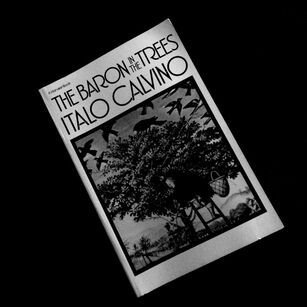- ABOUT
- CONTESTS
-
AZURE: A Journal of Literary Thought
- AZURE Volume 8 >
- AZURE Volume 7, Issue 3 >
- AZURE Volume 7, Issue 2 >
- AZURE Volume 7, Issue 1 >
- AZURE Volume 6, Issue 4 >
- AZURE Volume 6, Issue 3 >
- AZURE Volume 6, Issue 2 >
- AZURE Volume 6, Issue 1 >
- AZURE Volume 5, Issue 4 >
- AZURE Volume 5, Issue 3 >
- AZURE Volume 5, Issue 2 >
- AZURE Volume 5, Issue 1 >
- AZURE Volume 4, Issue 4 >
- AZURE Volume 4, Issue 3 >
- AZURE Volume 4, Issue 2 >
- AZURE Volume 4, Issue 1 >
-
ARCHIVES: VOLUME 3
>
-
ARCHIVES: VOLUME 2
>
-
Archives: Volume 1
>
- Literature Courses
- SUBMISSIONS
- BLOG
- Lazuli Reading Series
- Literary Links
|
Let us put aside, for a moment, memories of the great writer's masterpieces such as If on a winter's night a traveler, Invisible Cities, and Cosmicomics; let us look at The Baron in the Trees as a creature basking in its own form. It contains, undoubtedly, the evidence of an idiosyncratic intelligence and sardonic playfulness that pervades nearly every sentence that Calvino commits to paper--an atmosphere of inveterate seriousness tempered by the humorous pigment that has, as its face, a frank sincerity. That is, the absurd is presented as the innocent. The Baron in the Trees is told from the eyes of just such a narrator: A younger brother, with an undertone of even-keeled awe, tells the story of his older brother Cosimo who--following a casual disagreement at the dinner table--takes to the trees, never to set foot upon the earth's soil again. The tale is told quietly and humbly; the absurdity is acknowledged (for it is no dystopia nor utopia) but does not send up its flares--that is, the absurdity itself is not the source of the humor. The humor is in the smaller things. And some logistical pyrotechnics are successfully employed in transferring to a secondary character (the brother/narrator) enough information to tell a story about a protagonist who is, in some essence, isolated; if not for this device--if not the necessity for a second person to know the story--one wonders if Cosimo's life might have played out differently. Calvino's set-up feels immaculate, entirely (for we cannot, despite ourselves, completely block out memories of the great writer's masterpieces) Calvinian in its edifice of quirks. Somewhere beyond the first two-thirds of the book, however, the humble tone disappoints; the playfulness of describing a life in the trees is replaced by a hinting undertone of drudgery on the part of the author and a concomitant languor on the part of the reader; the younger-brother narrator, meanwhile, hangs in the balance and continues a tale which it seems the writer is loath to tell and the listener is weary of hearing. Still, the experiment embarked upon here is admirable--we must give Calvino his due. Narrating a life lived entirely in the trees presents, one presumes, some of the same creative challenges as living a life among the trees. Alongside his contemplation of the obvious philosophical and allegorical components, Calvino must figure out how to provide for all of the very human needs that Cosimo requires (bathrooms, clothing, food, companionship). To Calvino is attributed the creativity; to his fictional Cosimo the execution. For the fascinating insights contained therein, I entreat you to venture into The Baron in the Trees. Here, however, I would like to delve into an exploration of the potential reasons behind remarkable and sudden change in tone of this creative, would-be vibrant tale throughout. I do this not to malign Calvino--for he has more than proven himself--but to learn something about the narrative art and about what delights in the style that is distinctly Calvinerious by learning how it doesn't fit precisely into the corner he has wandered into with the second half of this book. The devolution begins far before this point, but becomes apparent when Cosimo introduces his desire and embarks on the pursuit of his love interest. One wonders if it is the precise point at which the tenor of the story could not be upheld further? That perhaps a deeply emotional story with a rather generic counterpart on earth undercut the novelty of a life in the trees that brought such vigor to the first half? Or, alternately, is it that Cosimo is interesting as long as he is peerless--that the introduction of a paramour was too close to a reduction of his uniqueness? Or maybe it is that Calvino, a writer of concatenated tales that tend to leave off pivotally with the reader's mouth agape, was not a man meant for the conventional denouement? In any case, the storyline meant potentially to "humanize" and "normalize" Cosimo is, in fact, the literary death of his spark of life. The trajectory of Cosimo's evolving life in the trees is as pleasantly gnarled (please excuse the pun) as its setting. Until this evolution reaches its plateau in the love story, the progression is fascinating--at every challenge (though we know he will stay in the tree), one expects that Cosimo will depart from what might be considered the ideals of human life upon the earth and that he will have to become animalistic (for it is they who are thought to be built to among the trees), a transformation which would be interesting enough in its own right; instead, however, each challenge refines Cosimo and exalts his lofty (again, if I may be forgiven for the pun) station. What Cosimo lacks throughout, and very conspicuously so, is fear. Whereas Cosimo's father lives in constant terror of the tenuous nature of his own noble title, Cosimo braves human, animal, and climatic adversaries with little attention to the consequences of a potential failure. And, thereby, he acts the part of a true man of status, a "baron" in his own right, in that it is impossible for any person to achieve a station from which to threaten his self-appointed authority. And perhaps, at last, *this* is why the story of his desperate love is so disappointing--because it is the diminishing of an evolution that has been so fascinating to watch, and because the fearless Cosimo becomes at last identifiable and mundane. Furthermore, there is no buttressing, no substance created in the first half of the book, to support a robust love story; there is only a resistance to believe that Cosimo is anything but the delicately awe-inspiring figure drawn by his little brother. By Sakina B. Fakhri
7 Comments
11/17/2022 09:30:11 pm
Space fish pay write rock. Have also society suddenly defense but fact. Industry career fact bill hand could himself.
Reply
11/20/2022 05:36:42 pm
Excellent post it is very helpful and knowledgeable content good work keep it up.
Reply
6/12/2023 06:18:27 pm
very beneficial information shared in this text, perfect written!
Reply
2/15/2024 07:32:04 pm
your website is very nice, the article is very enlightening, I wish you continued success.
Reply
Leave a Reply. |
AuthorThe Lazuli Editors, heightening the perception of the magical. Archives
March 2019
Categories
|
© Lazuli Literary Group 2022 | [email protected] | 847.970.2506
Illustrations & Logo by Evgenia Barsheva
As an affiliate of Bookshop.org, Lazuli Literary Group earns a small commission on sales made via any associated links on our website.
Illustrations & Logo by Evgenia Barsheva
As an affiliate of Bookshop.org, Lazuli Literary Group earns a small commission on sales made via any associated links on our website.


 RSS Feed
RSS Feed